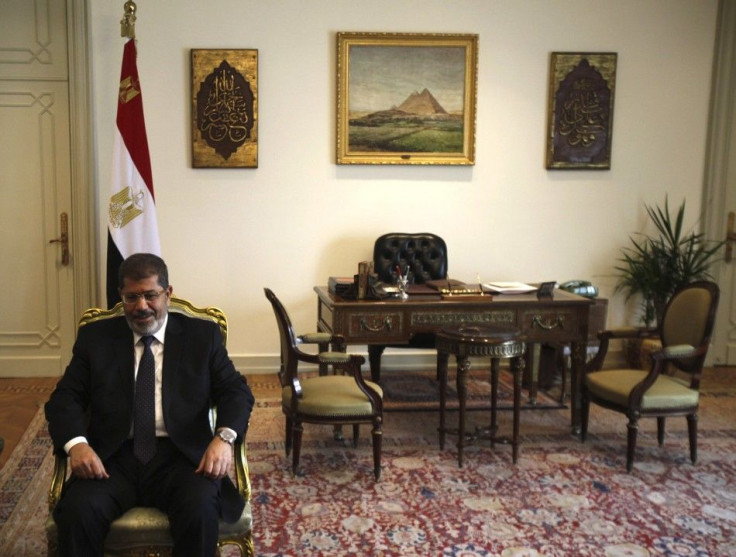Egyptian President's Conciliatory Letter To Israel A Fake - Or Is It?

An apparent extension of goodwill on the part of Egypt's new president Mohammed Morsi has already turned sour, as Morsi's office claimed that the president did not, in fact, send a letter to Israeli President Shimon Peres promising to exert his "best efforts" for peace with Israel.
On July 31, Peres's office released the text and picture of a letter it claimed came from Morsi in response to a similar missive that Peres sent Morsi a month earlier, congratulating him on his election victory. On Wednesday, Morsi's spokesman Yasser Ali said in a statement that "everything that was reported in the Israeli media regarding the letter does not correspond to reality" and it was all "fabricated."
"President Mursi has not sent anything to Israel," Ali told Reuters, and called reports of the letter "slander." But that's not what the Israelis think.
The letter to Peres, which looks like it was typed but is unsigned, says simply, "It was with deep thanks that I received your congratulations on the advent of the Holy Month of Ramadan.
"I take this opportunity to reiterate that I am looking forward to exerting our best efforts to get the Middle east Peace Process back to its right track in order to achieve security and stability for all peoples of the region, including the Israeli people."
The letter is addressed to "H.E. Mr. Shimon Perez, President of the State of Israel," and signed from "Mohamed Morsy, President of the Arab Republic of Egypt."
The Israeli English paper Haaretz reported yesterday that the letter was delivered to one of Peres's military advisors from an unnamed diplomat at Egyptian embassy in Tel Aviv. An anonymous Israeli official from Peres's office told AFP that the letter was real, and that the denial was somewhat expected given "the letter's high publicity in Israeli and Egyptian media," and was likely due to internal political pressure.
Another unnamed Israeli official also told AFP that "the tone of the letter was "a general message with a positive spirit, but did not indicate any new direction" for relations between the countries.
Morsi is a member of the Muslim Brotherhood, a party which, while more moderate than other Islamist groups on issues such as freedom of press and democracy, is known to be hostile to Israel, and is linked to the militant Islamist group Hamas, which has claimed responsibility for many of the attacks on Israeli settlers in the West Bank and Gaza.
Because of this, Israeli politicians have been somewhat on edge since Morsi and the Brotherhood emerged victorious in the June presidential elections, and the future of the 1979 peace treaty between the two countries has been uncertain. The letter was reportedly greeted by some Israeli officials with surprise and enthusiasm, according to the New York Times.
Washington has also kept a close eye on Egypt-Israel relations since June, and has insisted that Egypt's new leadership respect the treaty with Israel, according to Al-Arabiya.
© Copyright IBTimes 2024. All rights reserved.












